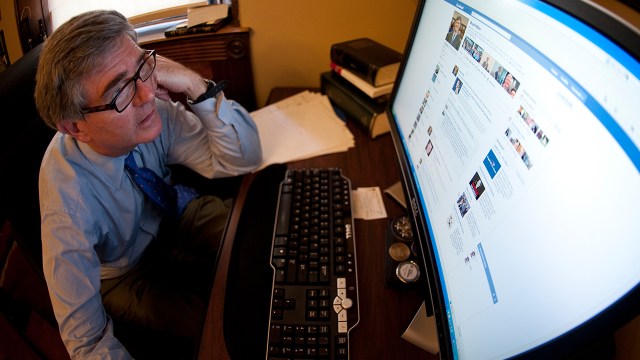
Americans are more critical than people in any other country surveyed by Pew Research Center this year of the impact that social media has on democracy. Nearly two-thirds (64%) of U.S. adults say social media has been more of a bad thing than a good thing for democracy in the United States. Though this negativity generally persists in both parties, there are significant partisan and ideological differences in the strength of this view and others related to social media and politics.
This Pew Research Center analysis focuses on partisan and ideological differences in Americans’ views about the impact of social media on democracy and politics in the United States.
For this analysis, we surveyed 3,581 U.S. adults from March 21 to 27, 2022. Everyone who took part is a member of the Center’s American Trends Panel (ATP), an online survey panel that is recruited through national, random sampling of residential addresses. This way nearly all U.S. adults have a chance of selection. The survey is weighted to be representative of the U.S. adult population by gender, race, ethnicity, partisan affiliation, education and other categories. Read more about the ATP’s methodology.
Internet use and social media use data in the U.S. comes from a phone survey conducted Jan. 25 to Feb. 8, 2021.
Here are the questions used for this analysis, along with responses, and its methodology.
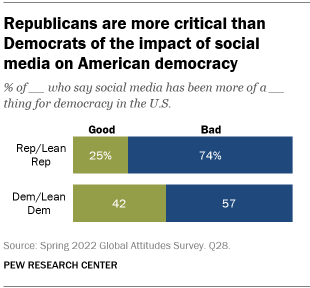
About three-quarters of Republicans and Republican-leaning independents (74%) say social media has been more of a bad thing for U.S. democracy, compared with a smaller majority of Democrats and Democratic leaners (57%).
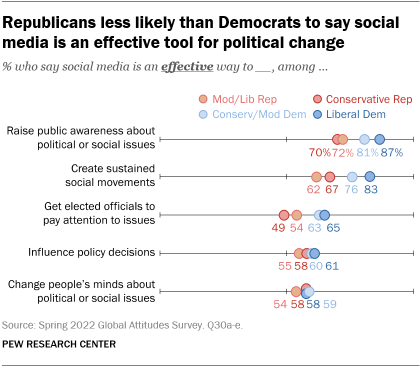
On balance, Republicans offer more negative evaluations than Democrats of the impact of social media on American society. They are less likely than Democrats to say social media is an effective way to raise public awareness about political or social issues (71% vs. 83%) and create sustained social movements (65% vs. 79%). Republicans are also less likely than Democrats to say social media can effectively get elected officials to pay attention to issues (51% vs. 64%). There are no partisan differences when it comes to whether social media can actually influence policy decisions or change people’s minds about political or social issues.
Republicans are also less likely than Democrats to say that access to the internet and social media has made people more informed about domestic events (61% vs. 69%); more accepting of people from different ethnic groups, religions and races (32% vs. 39%); more informed about current events in other countries (62% vs. 68%); and more civil in the way they talk about politics (12% vs. 17%).
Meanwhile, Republicans are more likely than Democrats to say social media has led to increased division in political opinions (82% vs. 78%). Large majorities of both Democrats and Republicans say people are easy to manipulate with false information and rumors due to social media (though Democrats are more likely to consider the spread of false information a threat to the U.S.).
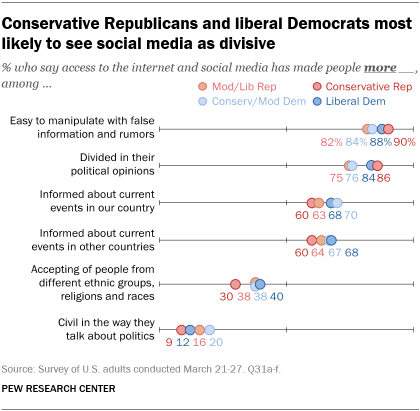
Within each party, there are significant ideological differences in Americans’ views on these questions. Those on the ends of the ideological spectrum – conservative Republicans and liberal Democrats – are more likely than moderates in their party to say social media is politically divisive and that it has made people less civil in the way they talk about politics. These findings echo a Center survey from earlier this year, which found that conservative Republicans and liberal Democrats are both more likely than moderates in their parties to say technology companies are having a negative effect on the way things are going in the country these days.
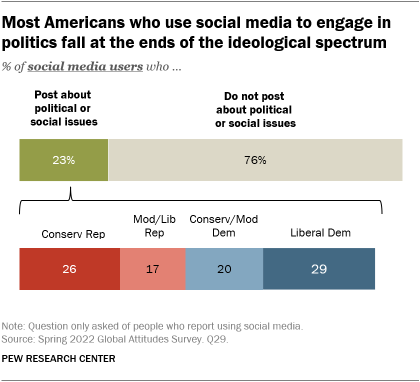
Despite their concern about the impact of social media, conservative Republicans and liberal Democrats are the ones most likely to spread political or social messaging themselves (a pattern consistent with previous Center findings). While just 23% of Americans who use social media post about political or social issues, most of those users (55%) identify as conservative Republicans or liberal Democrats.
Note: Here are the questions used for this analysis, along with responses, and its methodology and full dataset.